"Data to humanize and humanize with data". This is the slogan of the XIX edition of Databeers Malaga, which returns to its original face-to-face format after being virtualized as a result of the pandemic. The event, which is part of the activities of Mobile Week Malaga, will be held next Thursday, December 9, 2021, starting at 7 p.m., at La Caja Blanca, located in the university area of Teatinos in Malaga.
The event will seek to demonstrate how big data, data analytics and visualization, and open data can improve people's daily lives. It will address the usefulness of data to improve the physical and emotional well-being of people and even save lives by anticipating emergencies or risk situations. It will also discuss how to make organizations and entities more open, transparent and social.
Top-level presentations
As on other occasions, the event will be structured around short, informative talks by academics, professionals and entrepreneurs. All talks will be short, about 7-8 minutes, informative and non-technical, in line with the classic Databeers format. Animated gifs and other resources will be used to help understand how the initiatives presented were developed and the essential role of data in them.
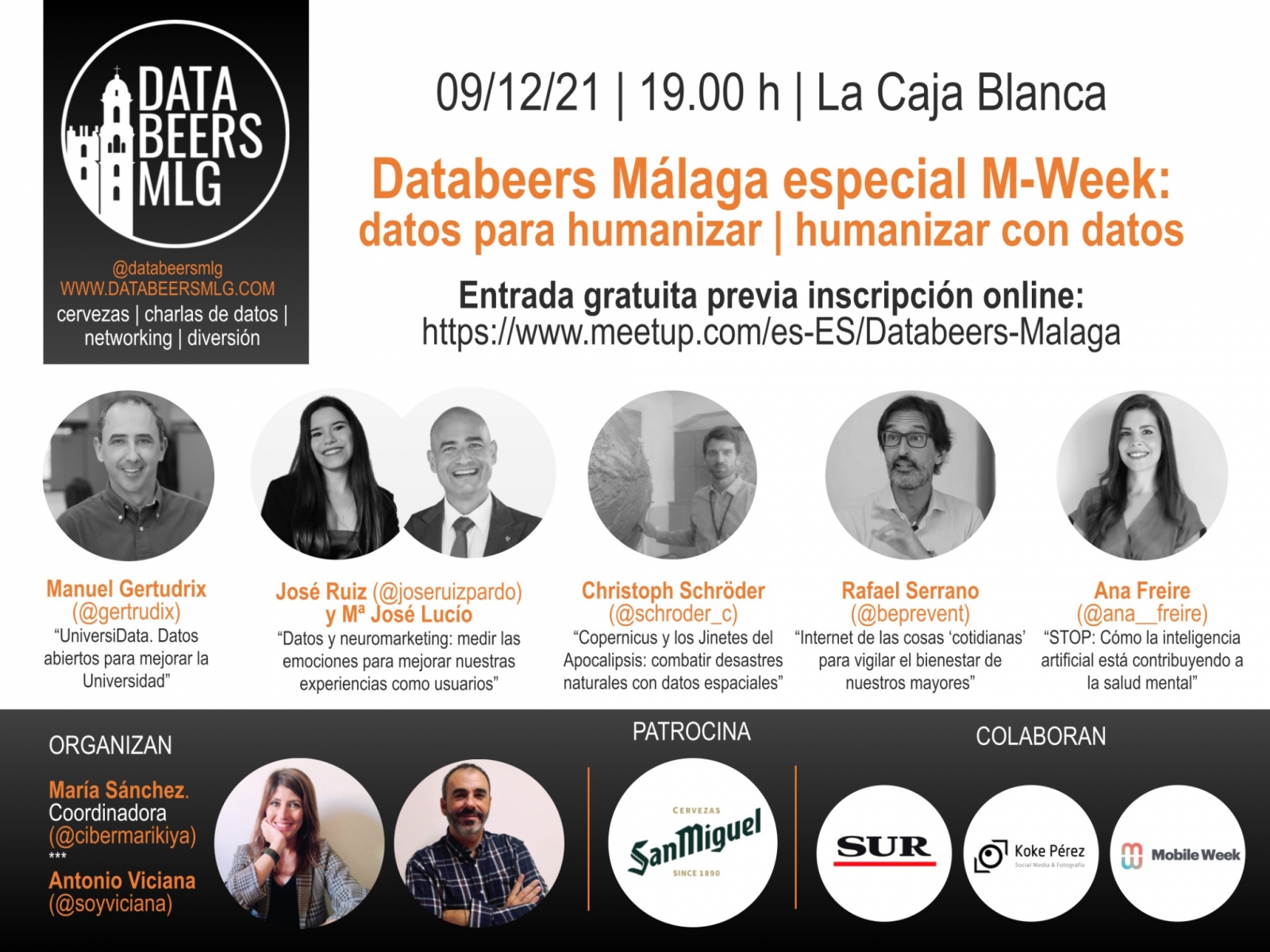
- The event will be opened by Manuel Gertrudrix, professor and researcher in Digital Communication at the Rey Juan Carlos University, presenting UniversiData, a collaborative open data portal specialized in the Higher Education sector. As a result of this portal was born the UniversiData-Lab project, winner of our III Aporta Challenge, focused on the advanced and automatic analysis of the datasets published in UniversiData. Both projects demonstrate the potential of open data to make decisions, anticipate and innovate in the university, as well as in any other organization.
- Next, José Ruiz and María José Lucío, CEO and director of DataScience and DataTech development, respectively, at the Malaga-based company GOLI neuromarketing, will share a catalog of experiences that show how measuring the emotions or behavior of users makes it possible to improve our experiences as consumers, travelers, etc.
- He will be followed by Christoph Schröder, researcher in Geographic Information Systems and Environment at the European Topic Centre of the University of Malaga. Under the slogan "Copernicus and the Horsemen of the Apocalypse" he will present the power of land monitoring systems and spatial data to combat natural disasters (volcanic eruptions, earthquakes ...) such as those we are experiencing in the last year.
- After him, Rafael Serrano, CEO of the Cordoba startup BePrevent, will show us sensors and other solutions based on the Internet of 'everyday' things to monitor the health and care of our elders and other loved ones.
- Finally, Ana Freire, professor and researcher at Pompeu Fabra University, will present the project she is responsible for: STOP. This project shows how social network analytics can be used to search for patterns of suicidal behaviour, demonstrating how artificial intelligence can contribute to our mental health in these uncertain times.
There will also be, as in other events, time for networking, accompanied by beers from San Miguel, sponsors of the event, which will add different special varieties of beer to the event. The beer brand, as part of its commitment to the economic and social development of the province of Malaga, has been supporting Databeers Málaga since the beginning of 2018.
Free registration
The event is open to anyone interested and free of charge, although pre-registration is required due to capacity limitations in accordance with pandemic health and safety regulations. Registration is available on the event's Meetup space, where the full program can also be viewed.
As usual, the videos will be offered openly, along with the presentations used, at the Databeers Malaga website, where there is already a large amount of licensed material that allows its use and reuse.
About Databeers Málaga and collaborators
Databeers Málaga is a community dedicated to organizing informative talks and networking events around big data, data analysis and visualization applied to different disciplines. Since it started at the end of 2015 they have gathered around 2,700 participants in its 18 editions (the last two, virtual due to the pandemic). It is currently organized by María Sánchez (@cibermarikiya), professor and researcher in Journalism at the University of Malaga and Innovation technician at the International University of Andalusia and Antonio Viciana (@soyviciana), business creation technician at Promálaga, and has the usual collaboration of photographer Koke Pérez, Diario Sur and Cervezas San Miguel.
This edition will be "special", not only because it will mean meeting face to face with the public of their community and adding new people, but because it has been orchestrated, according to its coordinator, in line with the M-Week itself and the times we live in. It will be one of the most "civic", "emotional" and "impactful" editions, as the talks will deal with topics that "affect us all directly or indirectly" and address very tangible and high-impact issues.
From the organization of Databeers Malaga also invite you to join the other activities that will take place between 9 and 12 December, as part of Mobile Week 2021 (M-Week). This is a macro event that seeks to bring technology closer to citizens with activities that will revolve around four major themes: digital transformation, training, communication and social sustainability.
After having been postponed due to the confinement before the Covid-19, last Thursday 24 September the XVII edition of Databeers was held by videoconference, in the framework of the Hackaton Copernicus Malaga. The event could also be followed by streaming via Youtube, maintaining the open and free character of the community meetings, which started in Malaga five years ago. This new format aroused the interest of the audience, with more than a hundred people registered and a wide repercussion on social networks.
A new format with many advantages
Held in the context of the Hackaton Copernicus Malaga, this edition of Databeers focused on the projects and applications based on open data and services from the European Earth Observation Programme Copernicus.
There were five talks, all of them of short duration, informative tone and close to pecha-kucha format, given by prestigious national and international experts. A tasting of different varieties of beer was interspersed with these talks. San Miguel, a brand that has supported Databeers Málaga since 2018, brought the beers to the homes of those attending the event.
The event began with a presentation by María Sánchez, coordinator of the Initiative, who highlighted that this edition meant a great challenge in terms of organisation, given the need to carry out the event safely, but without losing its essence "through a screen, beer and networking included, differentiating us from the many webinars held nowadays". Although - commented Sánchez - the screen limits the interaction and experience that takes place in a bar, the virtual format opens up new possibilities, and made it possible to have speakers from different geographical locations and to connect many people beyond Malaga.
5 interesting talks on applications of Copernicus data
The opening speaker for this Databeers Málaga Copernicus special was Kevin Ramírez, Copernicus coordinator at Climate-KIC, who showed the potential of the initiative and its data as a tool to support a sustainable future. He was followed by Felipe Fernández, head of the Information Technology and Supercomputing Group at IHCantabria, who shared the results of the ApliCop project, designed to identify the actors in Copernicus Spain and to promote their collaboration and innovation through projects with data, some of which we have already covered in this article.
In this sense, from GMV Aerospace and Defence S.A.U., Jesús Ortuño and Julia Yagüe presented their work with remote data for sustainable forest management, while Juan Arévalo Torres, director of the Malaga-based company Randbee Consultants, focused on the way in which content and stories can be constructed, through storytelling and different visualisation techniques, to make the data attractive and understandable for citizens.
The event was closed by Sonia Castro, coordinator of open data at the public entity Red.es, who explained to those present the role of the Aporta Initiative in promoting interaction and citizen participation in the generation, use and reuse of open data. During her presentation, she toured the different sections of datos.gob.es, highlighting its usefulness for users who want both to locate new datasets and to identify use cases and keep up to date with all the new developments in the open data ecosystem in Spain. She also highlighted the guides we offer users and the interaction channels through which they can send us their requests and suggestions.

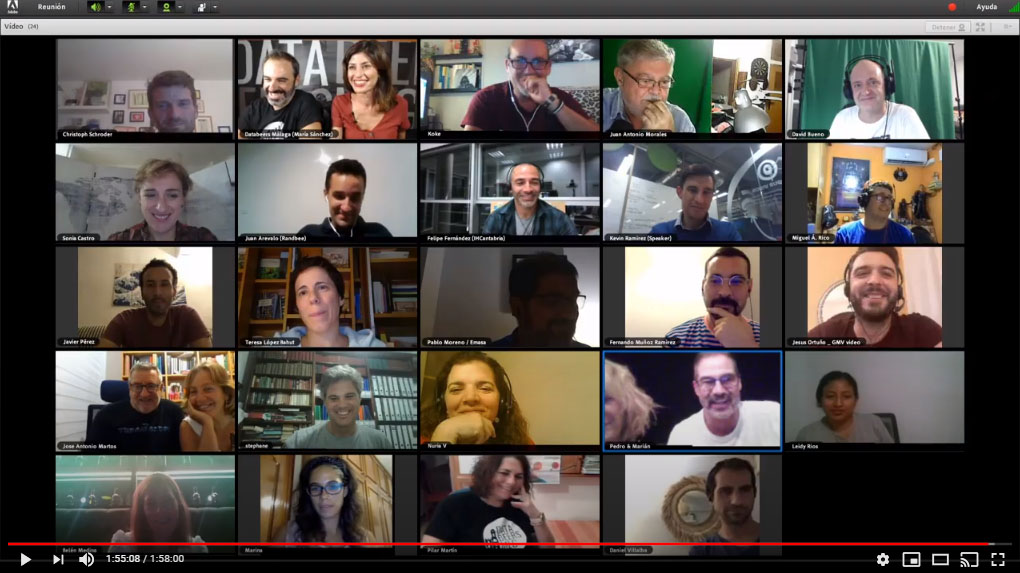
As usual, the event was recorded thanks to the collaboration of David Bueno (CEMI Málaga) and is available through the Databeers Málaga Youtube channel. Recordings of the talks and presentations used will soon be shared via www.databeersmlg.com. In this space you can find a lot of material, from this and other events, whose license allows its use and reuse. It is a good way to generate knowledge beyond the face-to-face events and the local environment.
After postponing the Databeers Málaga, scheduled for April in the framework of the Hackathon Copernicus Málaga, due to the confinement before the Covid-19, both events have a new date of realization:
- The XVII Databeers Málaga will take place on September 24th from 20 hours and will be held by videoconference.
- On the other hand, the hackathon will start on September 18th, also online, and will last until October 1st.
Databeers Malaga addresses the opportunities of Copernicus data
Given the context, the new edition of Databeers Málaga will be focused on talks about data visualization projects and applications with open data and services around the Copernicus lines of action.
The Copernicus project collects and stores data about the planet, through satellites in space and technologies such as measurement systems on land, sea and air. Copernicus offers this data in open format for use and reuse.
The Aporta Initiative, among the participants of the event
On this occasion there will be five talks, all of them of short duration, informative tone and format close to pecha-kucha. Almost all of them will show projects and applications around Copernicus' lines of action, atmospheric monitoring, marine environmental monitoring, land monitoring, climate change, emergency management and security.
The speakers will be the following:

- Kevin Ramirez, Copernicus coordinator at Climate-KIC, will open the event by showing its potential as a tool to support a sustainable future.
- Felipe Fernández, head of the Information Technology and Supercomputing Group of IHCantabria, will bring us closer to the Copernicus Spain network through a project designed to identify its actors and generate network (ApliCop).
- Juan Arevalo Torres, director of the company Randbee Consultants, will give a talk on "Storytelling with Copernicus data and services".
- Julia Yagüe, Member of the Remote Sensing and Platform Services Division of GMV Aerospace and Defence S.A.U., will show us the potential of remote data for sustainable forest management.
- Sonia Castro, Coordinator of open data in the public entity Red.es, will give a tour of datos.gob.es, highlighting those contents of most interest to the target audience of the meeting. It will be highlighted how to find data and practical applications of them; where to locate materials of interest for those who are entering into the development of digital content solutions, as well as the latest developments that from the Aporta Initiative are being carried out.
All this is coordinated by María Sánchez, who has already told us about the advantages of this type of event in this interview.
Digital format without losing the essence
Databeers Málaga has opted for the online format to facilitate the participation of speakers from different backgrounds and their follow-up in a secure way by the participants. "During the summer we held a virtual tasting, with talks also on data, by the hand of San Miguel, one of our sponsors", says Maria Sanchez, "and the experience was successful”. She explains how, despite the distance, the event did not lose the essence of the Databeers community, "including interaction with the speakers over beers, but this time at home”.
Trusting in the response of the community and considering that it can be, in addition, of interest for the own assistants to the hackathon, Databeers Malaga has decided for it to be launched online, recovering to the speakers foreseen for April and with the same approach that then.
How can you participate?
Registration is, as always, free of charge. For this event, it is essential to register previously online before September 18th, both in the Meetup space of the event, where you can also see the complete program, and through the form.
As has been the case in previous events, it will be recorded and the videos will be offered openly, together with the talks’ presentations, through the online space, www.databeersmlg.com, where there is already a large amount of material, whose license also allows its use and reuse. The aim is to generate knowledge beyond the face-to-face events and the local environment.
About Databeers Málaga and collaborators
Databeers Málaga is a community dedicated to organizing events, informative talks and networking around big data, data analysis and visualization applied to different disciplines. Since it started at the end of 2015, there have already been sixteen editions, so far face to face, which have brought together more than 2,200 participants. It is currently coordinated by María Sánchez (@cibermarikiya), professor and researcher in Journalism at the University of Málaga and technician in Innovation at the International of Andalucía, and has the collaboration of the photographer Koke Pérez, Diario Sur, the Municipal Center of Informatics of the Málaga City Council and Cervezas San Miguel. The beer brand, as part of its commitment to economic and social development of the Malaga province, supports Databeers Malaga since the beginning of 2018.
Geospatial data users have a new appointment to make in their diaries. The Copernicus Hackathon Malaga will take place from 18 September to 2 October 2020, virtually.
What is Copernicus Hackathon Málaga?
The Copernicus Hackathons are events for creating innovative digital applications and finding solutions to real world challenges, using data from Copernicus and Galileo, European Earth Observation and GPS positioning programmes, respectively. They focus on the organisation of several work teams to jointly develop new concepts and innovate in the use of existing data with practical applications for citizens and businesses.
In the specific case of Copernicus Hackathon Málaga, the thematic focus is on the current challenges of this city. Malaga and its metropolitan area represent a clear example to follow of Smart City applications, which combine green solutions to address the effects of the climate crisis. This is why it has recently been recognised as 2020 European Capital of Smart Tourism. As a coastal city, one of its main lines of action is sustainable blue growth. In this sense, applications based on Copernicus can be useful tools for improving urban management, business opportunities and citizen involvement.
Copernicus Hackathon Málaga will focus on developing digital content solutions, with particular attention to the climate crisis and its effects on society, the economy and the environment in the Mediterranean, and through three specific challenges:
- Digital content for Green and Smart Cities
- Digital Content for Sustainable and Intelligent Tourism
- Digital Content for Sustainable Blue Growth
The results of the Hackathon will serve a wide audience of users at the level of public administration, businesses and citizens.
It is worth noting that a new edition of Databeers Málaga will take place within the framework of this event, you can find more information about it in this article.
Who is it aimed at?
The event will bring together developers, entrepreneurs and experts with the aim of creating new applications based on data and services from Copernicus, the European Earth Observation Programme.
Participants will have the opportunity to work with thematic experts in remote sensing and entrepreneurship to develop a practical programming experience that responds to societal challenges such as the climate crisis and sustainable development through the innovative use of new technologies.
What does the winning team get?
The presentation and award ceremony will take place on the 2nd of October at the National Digital Content Pole of Malaga City Council l.
The winning team will have access to the Copernicus Accelerator Programme, a 12-month accompaniment programme for young entrepreneurs that includes coaching, boot camps, online training and access to networks. The collaborators of the Malaga edition will offer other prizes, including a place in the co-working space of the DigitaPolo l and mentoring for 6 months.
What do you have to do to participate?
In order to participate it is necessary to fill in the registration form on the event's website: copernicus.adabyron.uma.es, where you can also find more information about this event.
The registration period is open until 10 September.
Who is organising it?
Copernicus Hackathon Málaga is organised by the European Topic Centre of the University of Málaga (ETC-UMA), together with the Strategic Chair of Geotechnological Resources for Economy and Society, and is part of the Copernicus Hackathon Programme, funded by the European Commission.
The event also has the collaboration of the National Digital Content Pole of Malaga City Council, the companies Randbee Consultants, Cartometrics and GMV, as well as the support of Climate-KIC, SpaceTec Partners and the European Association of Remote Sensing Companies (EARSC).
The event, framed in the International Congress of Transparency, will take place as a crown jewel of the first day of this congress, on September 30, in Le Grand Café Center of Malaga. The event will offer presentations by journalists, technologists, activists and other expert profiles on this subject, networking and beer for free to attendees.
The XVI edition of Databeers Málaga will take place on Monday, September 30, starting at 7.30 pm, at Le Grand Café Centro, in the heart of Malaga. The capacity will allow to accommodate the usual community of Databeers and any citizen interested in the subject, as well as the numerous people registered in the International Transparency Congress to be held in the city between September 30 and October 2.
Hence, on this occasion the talks, brief and informative, revolve around citizen participation, open data and other topics related to transparency and the so-called Open Government in public administrations:
- The first talk will be given by Juan Romero Raposo, co-founder of one of the pioneer citizen groups in promoting these principles in Spain, OpenKratio. Under the title of “Organizational Paradigms for Open Government”, he will explain how companies and other organizations have been reviewing their organization to adapt it to the open culture and technological and social advances, something that does not always happen when we talk about political organizations.
- Next, Victoria Anderica, expert in Transparency, Citizen Participation and Open Government and currently advisor of the Municipal Group Mas Madrid in the City of Madrid, will show the evolution and some of the current challenges of transparency in Spain.
- Then, journalist Iván Gómez, editor of GobiernoTransparente.com, will provide an international vision, on practical cases, of government plans as an accountability tool and active transparency in which open data and visualizations are put into practice.
- Another journalist with extensive experience in open innovation and citizen participation, driving force behind the open government plan of the Basque Country IREKIA, Nagore de los Ríos, will ask whether transparency in administrations today, a decade after having joined these policies after the Obama effect, is in accordance with the new times.
- Next, a vision of social innovation with Matías Nso, director of kuorum.org, who will explain how, according to his words, although "citizen participation allows to design public policies and services better adapted to the needs of each municipality, if we don't use the right tools we can misinterpret the data”.
- The event will close with the presentation, by David Aurusa and Arantza Lozano, of the OpenODS project, developed by two cooperatives, Enreda and Creating Consciousness. It is a comprehensive system that allows, through data, to identify and visualize actions, as well as measure the impact on the achievement of goals and objectives of each organization or institution regarding to the 2030 Agenda.
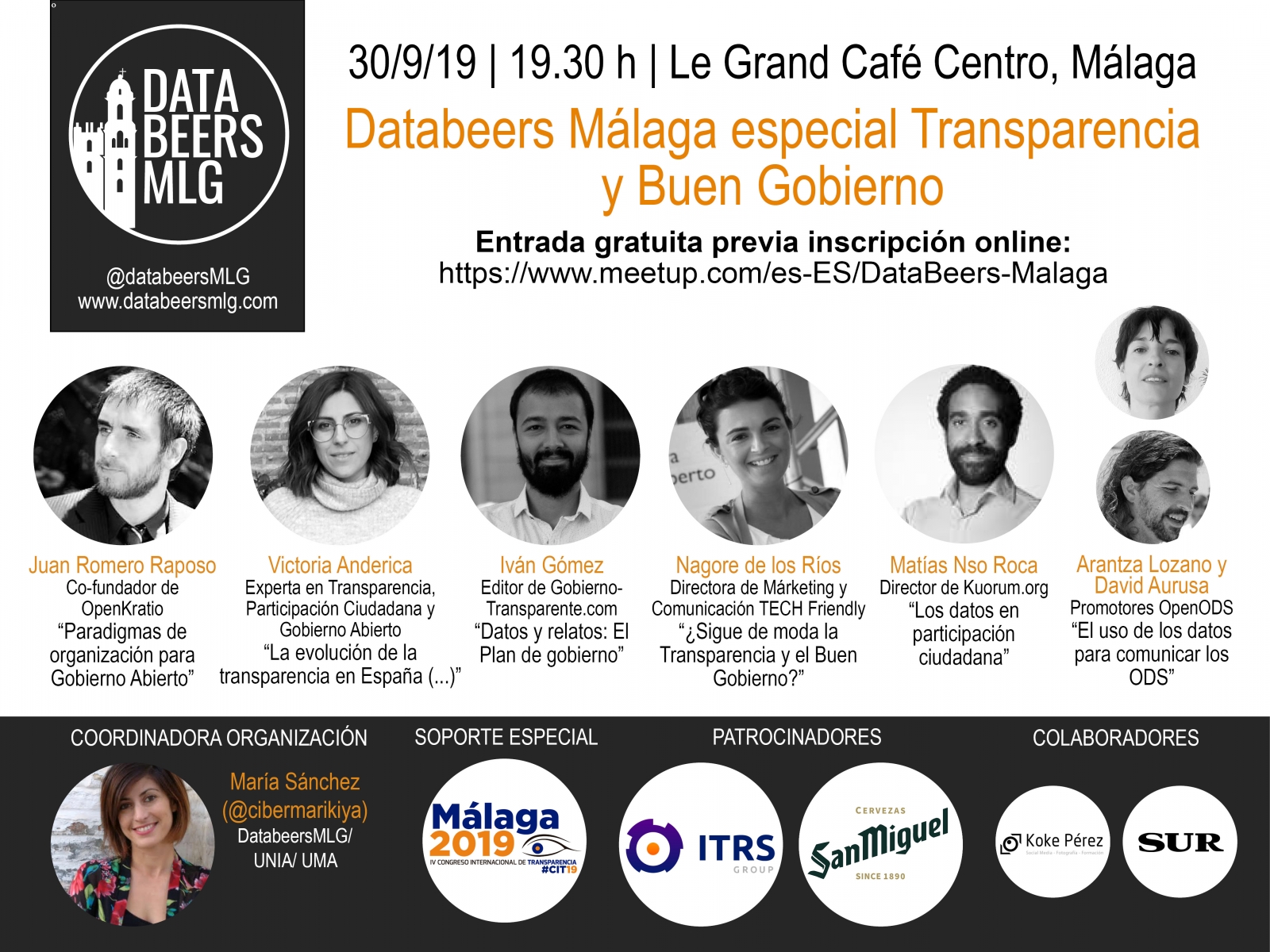
In addition to the support of the International Transparency Congress, in this edition, Databeers Málaga has ITRS as a sponsor, and collaborators such as photographer Koke Pérez, Diario Sur and Cervezas San Miguel, which, within the framework of its commitment to Malaga economic and social development, supports Databeers Málaga since the beginning of 2018. The place chosen for this, Le Grand Café Centro, is precisely one of the TapStation -spaces with different varieties of draft beer inspired by the style of various cities in the world - that San Miguel has in Malaga.
Registration for the event is, as always, free, but due to the limited capacity it is essential to previously register online.
Databeers Málaga is coordinated and organized by María Sánchez, a Journalism professor and researcher at the University of Malaga and an Innovation technician at the International de Andalucía.
You can learn more about Databeers through this article and the interview we conducted with María Sánchez and Marcelo Soria, organizers of Databeers and Databeers Málaga respectively.
Databeers is a non-profit initiative specializing in dynamic events focused on different areas related to the data universe. The objective: to disseminate issues related to data, so fashionable and so habitually plagued with common places, myths and some confusion.
Datos.gob.es have talked with Marcelo Soria Rodríguez and María Sánchez, organizers of Databeers and Databeers Málaga respectively, to tell us their experience at the forefront of this project and reflect on the challenges and opportunities of open data.
Databeers emerged in 2014, in the city of Madrid. How did you come up with the idea?
Marcelo: In an informal talk at work, Daniel Villatoro, Giovanna Miritello and I discover that we had similar ideas. Daniel had already organized something similar, UrbanBeers, where they got together to talk about smart cities and data projects, and we thought that it would be a good idea to talk about data in general, and use the opportunity to get together with friends and meet new people. We were a little tired of talking about data in academic congresses somewhat stretched and far from the general public, or in industry events full of topics and focused on the products, not in the results. So we thought it would be a good idea that anyone could speak, without commercial interest, focusing the conversation on what is achieved, so that we can all understand it. We got out of control... the audience like the format and the community began to create events in different cities.
Databeers surgió en 2014, en la ciudad de Madrid. ¿Cómo se os ocurrió la idea?
Marcelo: En una charla informal en el trabajo vimos que teníamos ideas parecidas entre Daniel Villatoro, Giovanna Miritello y yo. Daniel ya había organizado algo parecido, UrbanBeers, donde se juntaban para hablar de proyectos de ciudades inteligentes y datos, y pensamos que sería bueno hablar de datos en general, y usar la oportunidad para juntarnos con amigos y conocer gente nueva. Estábamos un poco cansados de que se hablara de datos en congresos académicos un tanto estirados y alejados del gran público, o bien en eventos de la industria llenos de tópicos y donde había un interés muy centrado en los productos y no tanto en los resultados. Así que pensamos que estaría bien que cualquiera pudiera hablar, que no hubiera ningún interés comercial, y que a conversación se centrara en lo que se consigue, para que todos podamos entenderlo. Se nos fue un poco de las manos… gustó el formato y la comunidad empezó a crear eventos en distintas ciudades.
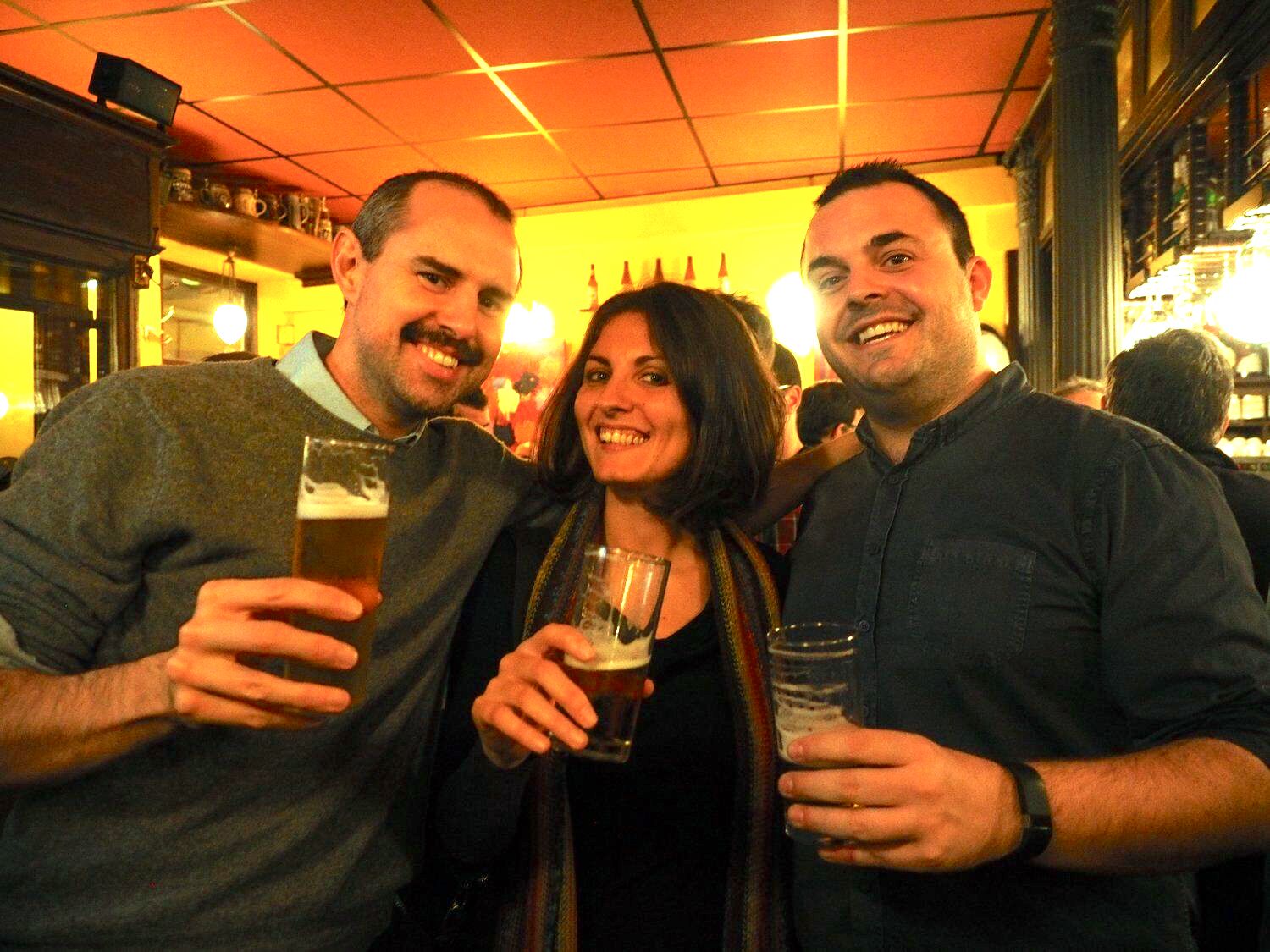
Marcelo Soria, Giovanna Miritello and Daniel Villatoro, founders of Databeers
In 5 years, you have grown in an extraordinary way, with branches in about thirty cities, many of them outside our borders. In your opinion, what are the reasons for success? What are the differences between Databeers and other events focused on disruptive data and technologies?
María: I think there are several reasons, apart from being an international community and a coordinated network, which always helps and enriches. First, Databeers organizes near and informal events, horizontal, in a relaxed atmosphere (sometimes in bars), in a schedule that allows to find a balance between work and family life, with beer and networking. And People, sometimes swamped with "suit and tie" and little interactive events, express their gratitude. The second reason is that the talks are high-quality with an informative tone, without technicalities, which makes them "affordable" and understandable for non-technical profiles, who now are also interested in learning about big data, data analysis, visualizations... In addition, many professionals with different profiles (marketing, journalism, tourism, public administration ...) and entrepreneurs have needs that can be meet by data. Our events allow people who have the questions to interact through networking, with specialized and technical professionals (developers, data analysts ...), who are the ones who can use the technology to implement solutions that answer those questions.
Hence - and this would be a third possible reason - communities such as Databeers Malaga have chosen to carry out thematic events, where the talks revolve around data applications in different disciplines. It was not really a premeditated strategy, but it has been done in part because the organizers of academic or professional macro events have invited us to make editions of Databeers under their wings. Some very interesting synergies (win-to-win), fruit of the prestige of Databeers that give more visibility to the community. And as a last reason, it should be notice that beyond the face-to-face events, we pay attention to social networks, interacting with the community and other actors, and we also pay attention to the generation of open and online knowledge through online repositories. Thus, for example, in Malaga, in addition to our space in Meetup and Twitter and Facebook profiles, we developed our own website, where -together with information from the community and events- we share all the images, presentations and recordings of the talks under Creative Commons license, thus enabling its use and reuse by any interested person. In the rest of the chapters, we also boost that knowledge persists to the extent of the resources that each city has. Many of the cities have a YouTube channel with recorded talks, for example, and some of them have also websites.
.
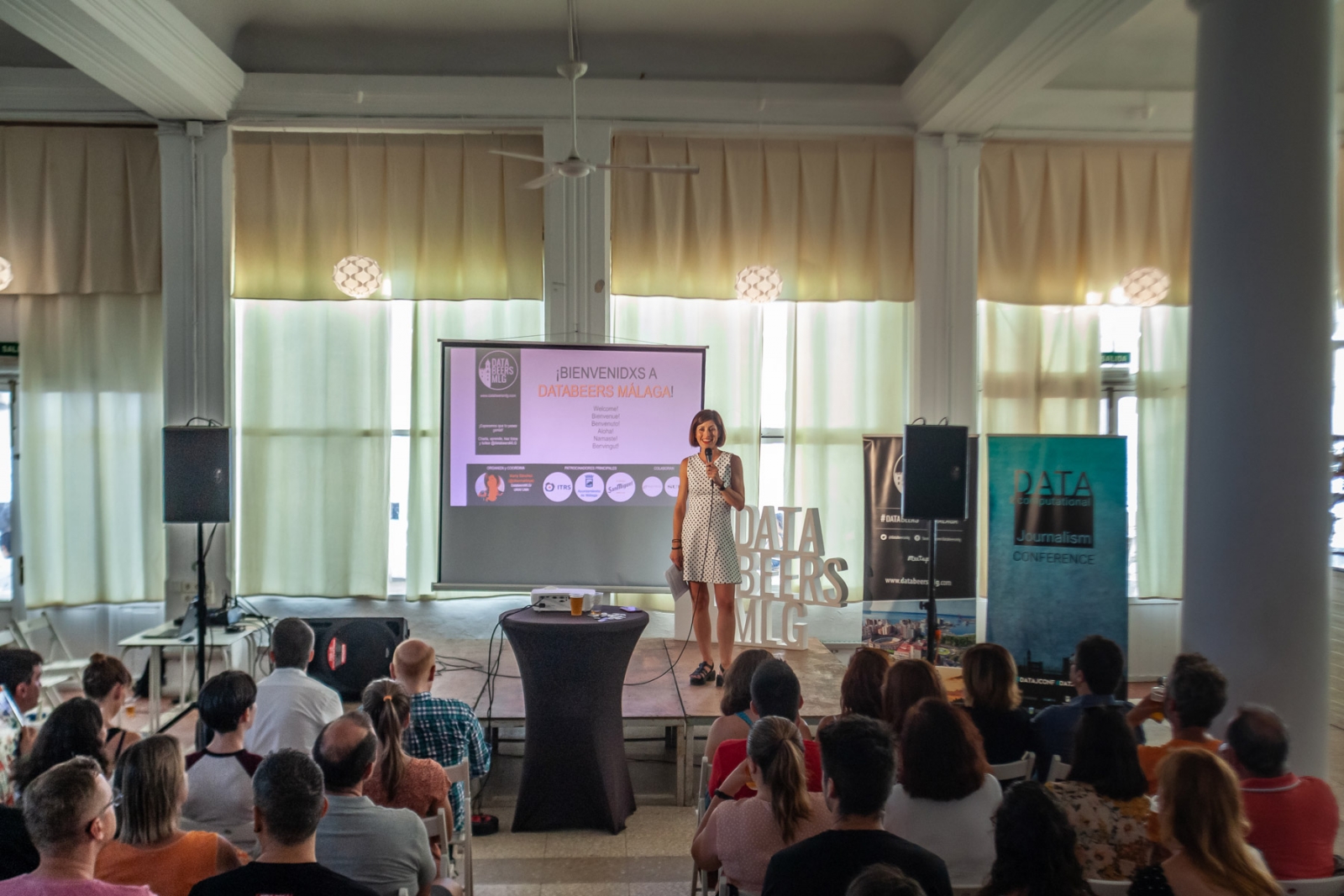
María Sánchez, organizer of Databeers Malaga. Photograph by Koke Pérez
What kind of audience usually attends your events? What are the areas within the data universe which most interest for the attendees?
Marcelo: Half or so are data practitioners, people who in one way or another have professional or technical knowledge related to this world: data analysts, data scientists, viewers, data engineers, etc. But we really like to see people coming from many other profiles, people who are outside the world of data but are curious. Lawyers, artists, businessmen, doctors, students, professionals, retirees and even young children who say “bravo!” in the middle of the speakers´ talk.
Talking about areas, issues related to privacy and data use tend to generate debate, as it could not be otherwise and especially in recent times in which there is a lot of media attention to what is happening. But the themes are very diverse and the public too, so there are talks about visualization, about open data, about data protection law, about how two researchers discovered that Beethoven's metronome was broken and many more examples. Each assistant has his own area of interest, and therein lies in part the success, as we have said: there is something for everyone, and always with a casual and very close perspective.
Some of the events you have organized have revolve around open data, such as Databeers Málaga Open Data. What do you think is the potential of open data in the current economic and social context? And what are the challenges to overcome?
María: Indeed, open data is part of the areas of interest of Databeers. In the case of Malaga, in addition to the 11th Databeers, which you mention and that was done within a technological macro-event, the OpenSouthCode, in June 2018, we have included talks on open data in subsequent events, such as the Special Greencities Databeers held in May 2019, which showed the potential of open data portals that many public administrations have been developing. Shortly before we also collaborated in the first open data reuse contest, organized by the Malaga City Council, a pioneer in this area. And on September 30, a special transparency and open government Databeers is planned that will also address open data projects, from a citizen and accountability perspective.
In my opinion, and I speak from the perspective of communication and education that is my sector, it is true that with the law of transparency and the culture of open knowledge we have many open data available, and that is certainly an opportunity, also for the professionals (think for example in data journalism). But on the other hand, apart from technical improvements of the open data portals, one of the biggest challenges lies, in my opinion, in the greater efforts that would have to be made to publicize the existence of these resources among the citizens. The so-called small data is not taking full advantage. And they will only be true useful open data when anyone can appropriate them to respond to their demands, having a more critical view of reality or improving their quality of life.
Marcelo: I agree with Maria, and I add that an additional challenge to the dissemination of these resources is to disseminate what can be done with them: how to use them, how to take advantage of them, how to combine with other disciplines to create useful products, services, solutions with a positive impact. It is not easy to formulate a problem well and understand how a given data set and specific techniques applied to them can help solve the problem. The part of formulating the problem (or determining the opportunity) is critical and we usually tiptoe around it. Understanding deeply that data is only a part of a solution, along with many other things, is complicated.
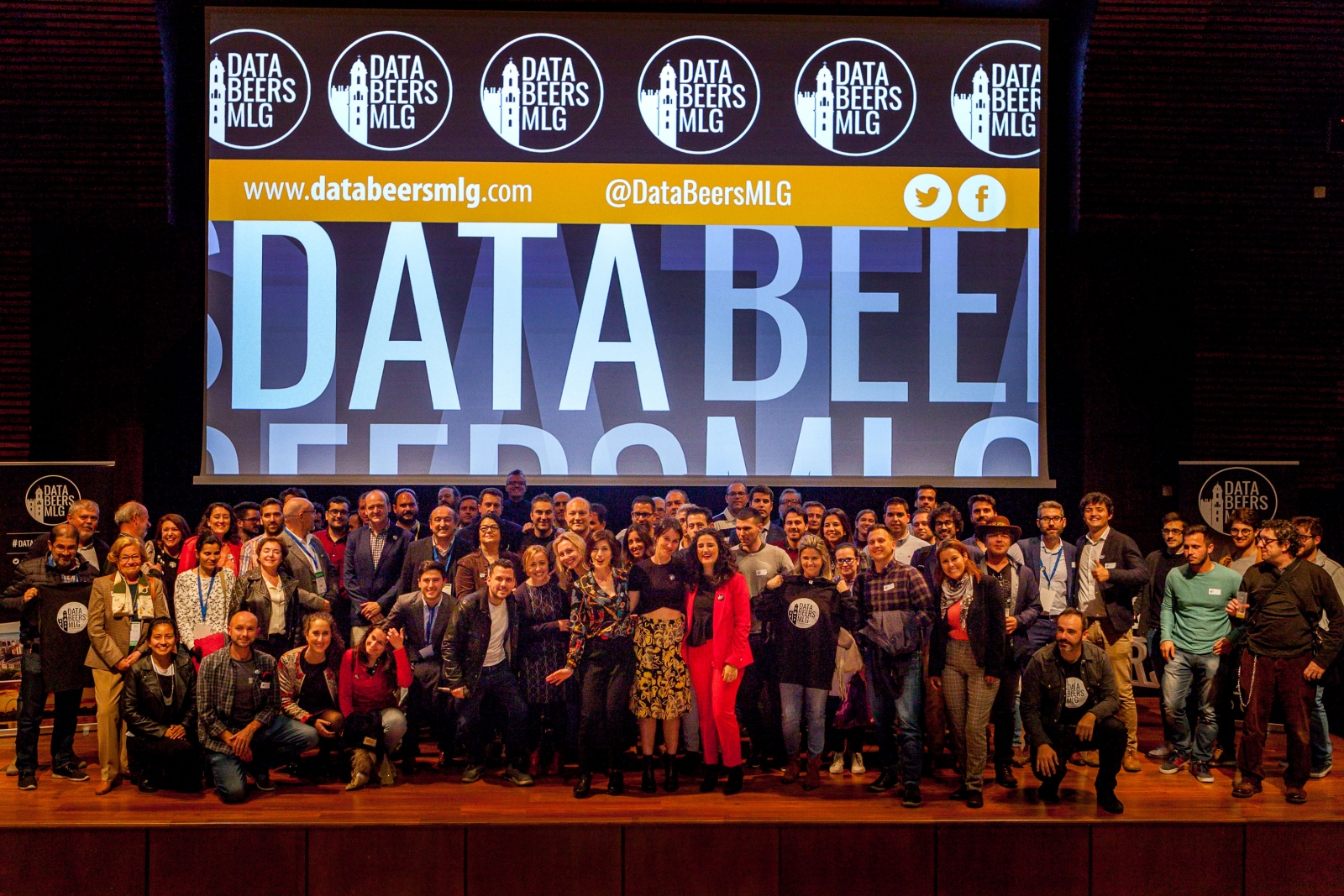
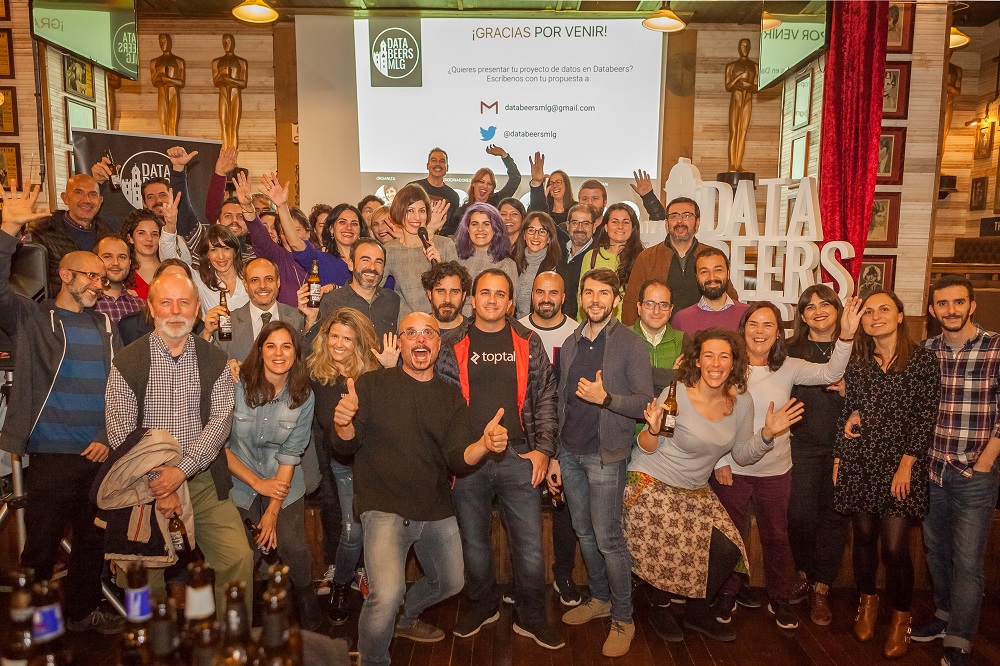
Last events Databeers Malaga. Photographs by Koke Pérez.
What data sets do you think are the most useful for professionals that are working with this raw material (developers, journalists, etc.)?
Marcelo: I don't think there are more useful or less useful data sets in general. Perhaps it can be argued that ingeneral the data sets that represent life (what we do, how we moves: how we transport ourselves, how we spend, what we read, what we think, how we interact, bus arrival times, etc.) are more useful than those that represent a static context (maps, school relations, bus lines, where the stops are) because they allow to know a changing world, and in that knowledge is the opportunity to create something that helps us to handle that change. But in reality, the important thing is to know well the problem that we want to solve, or know how to determine the opportunity we want to address, and the usefulness of the data will come derived from that objective. You always have to ask yourself first why we do something, what we want to achieve, and from that point, search and understand what data sets can help us. And what analysis techniques, as well as what other disciplines, have to be combined to achieve the final result.
What measures do you consider necessary to encourage the reuse of open data from public administrations?
María: As we already mentioned, citizen dissemination campaigns can be very interesting, aimed at non-technical profiles, accompanied by some training to know how to manage open data portals and take advantage of it. Perhaps, communities such as Databeers, or alliances between public administration and the university with basic and applied research projects that show interesting results using and reusing datasets, can also play a role in the future. I remember, for example, a project that Nuria Portillo, speaker of the Greencities Databeers and director of the Open Government Chair of the City Council of Valencia, told me about a student of statistics who, based on the data from the portal of this City Council, had shown that media can tell other kinds of stories.
Marcelo: Again, I agree with María. To add something, I think leading by example is interesting. Accompanying the dissemination of data, both open data and techniques for its use, with applications built on them, applications that have a clear utility and that are also reusable, can pave the way.
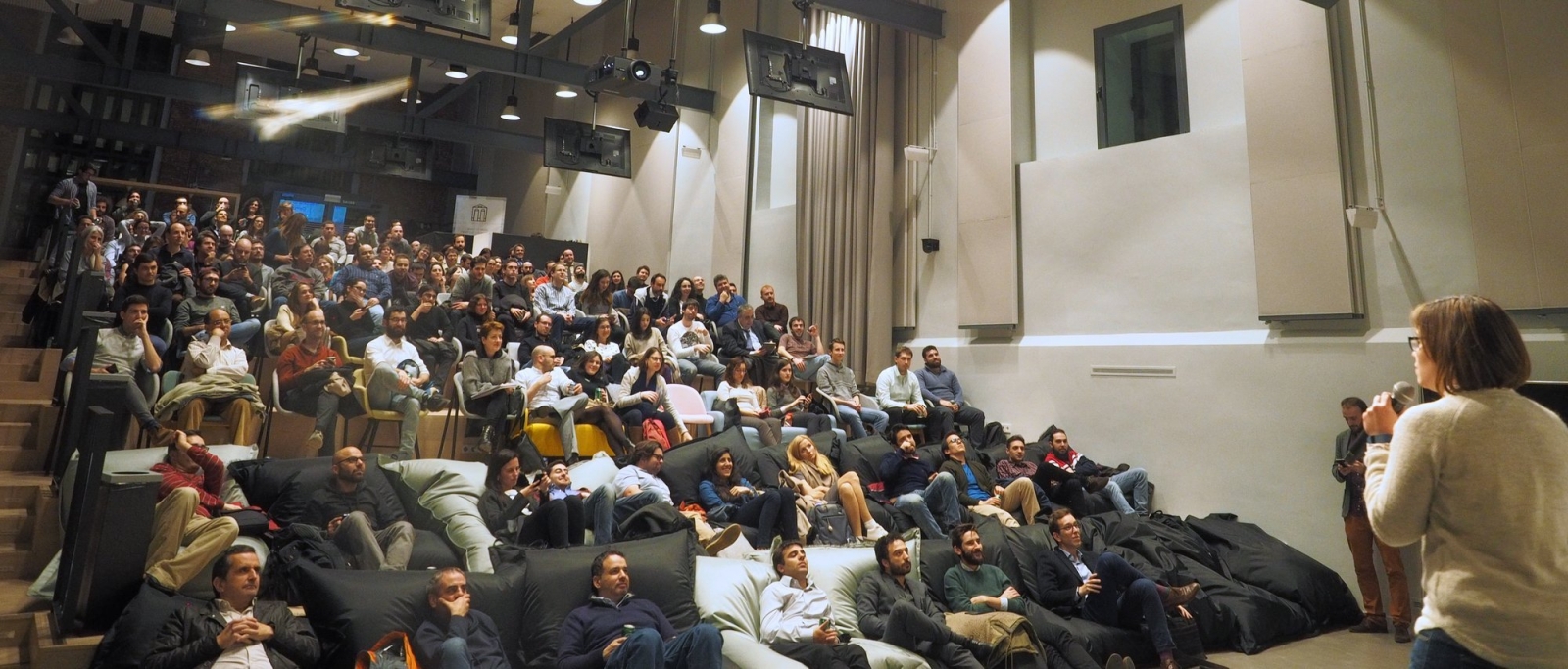
Databeers Madrid events. In the first image, Esteban Moro, professor at Carlos III University and MIT Media Lab. In the second image, Irene Rodríguez Luján, a UAM researcher and Senior Data Scientist at OpenBank.
Finally, can you anticipate what are the next events or projects that you are going to carry out?
María: We are at a point where Databeers has consolidated, and that implies a huge responsibility. We want to continue with the principles that define the community, of course, and the added value of, for example, publishing the talks online and maintaining our networked spaces. All this involves a great effort for the organization, which must be sustainable, and requires support in the form of sponsorships and collaborations, which are always welcome. In addition, the idea is to continue making synergies with other events to carry out thematic Databeers, or any other initiative to contribute, in short, to innovation and learning around a theme as essential today for any professional such as data.
Likewise, we want to continue promoting international growth, and make projects between several cities. We have ideas like a Databeers festival with representatives from all cities, or a cinematographic documentary that helps disseminate the data. Informative formats but also entertainment, informal as databeers style. For all this, we create a non-profit association in Spain that governs the finances of all the chapters and tries to channel these initiatives of greater importance.
Have data ever helped you understand something a little better? Do you use data analysis in your daily practice? Have you ever built a project based on data? Are you obsessed with data at any level? Do you like beer?
These are some of the questions posed by DataBeers organizers. If you have answered yes to most of them, you may want to know a little more about this non-profit initiative.
DataBeers was born in Madrid in 2014, by Giovanna Miritello, Daniel Villatoro and Marcelo Soria. Its aim was to create different event, more dynamic, simple and entertaining, away from the coldness of traditional conferences where speakers expose their vision of the theme in long expositions to a reactive audience. And for that, they thought that the best idea was to combine small talks - between 4 and 6 speakers which speech do not last more than an hour in total (7 minutes each) - with networking in a relaxed atmosphere accompanied by beers.
The success of the format was immediate. Proof of this, since 2014 they have not stopped growing, reaching thirty cities/regions in 10 countries: Barcelona, Alicante, Castilla y León, Euskadi, Valencia, London, Buenos Aires, Medellín, Venice, Copenhagen, Manila ... These are just some of the regions where branches have been installed. They work through a federated model, where each city has its own team of volunteers, although all have to respect common rules:
- Do not talk about code: talks are aimed at all kinds of audiences, not just technological experts.
- Use direct messages: the speeches have to be direct, and it is recommended to follow the Pecha-Kucha method (20 slides shown for 20 seconds each). The speakers can share a paper, an idea, a problem solved by data, a visualization, etc.
- Promote networking: the objective is to create an atmosphere that favours the exchange of opinions. In this atmosphere, some collaborations may even arise.
In their talks they have had more than 300 attendees, which shows the interest that exists to know more about the data universe. Even some companies such as Airbus or BBVA have been interested in the format. The themes are quite diverse, with general events, and others more specific.
For example, Databeers Málaga, one of the most active communities, founded at the end of 2015 and driven by María Sánchez, has organized, with support from the City of Málaga, ITRS Group and San Miguel, events focused on specific topics such as data for sustainable and smart cities (on the occasion of the conference Greencities 2019), Data, Sound and Music Industry or Open Data.
The next appointment is on July 2 at 7:30 pm at Balneario Baños del Carmen, as part of the activities around the European Data and Computational Journalism Conference that is held at the University of Malaga. Therefore, on this occasion, the central theme will be data journalism and informative visualizations. As always, the activity is free and open to any interested person.
In short, it is a great platform to share data-based stories, promote the exchange of knowledge and encourage the creation of new data communities.
September arrives, the holidays are over - with permission from those who have chosen this month to enjoy their well-deserved rest - and with it all sectors are returning to day to day routine. Although during these summer months many organizations have not stopped promoting activities around open data, such as the Government of the Canary Islands, it is now, with the autumn, when the level of activity increases.
Large format conferences
September, October and November are the months chosen by many organizations to hold general theme events that bring together a large number of audiences. In addition to the International Open Data Conference, which this year is being held in Buenos Aires, Argentina, on September 27 and 28 (it be followed through streaming), our country will also host various international events:
- The 5th edition of the Ibero-American Congress of Public Innovation Novagob2018 will be held from 24 to 26 October in Toledo. In order to promote innovation and collaboration to create public value, issues such as electronic administration, open government, new technologies or open data will be addressed. The event is organized by NovaGob, Junta de Castilla-La Mancha, City of Toledo, University of Castilla la Mancha, Spanish Federation of Municipalities and Provinces and its Network of Local Entities for Transparency and Citizen Participation.
- In addition, two international congresses will take place in Barcelona during the autumn. The first will be IoT Solutions World Congress (October 16-18), an event dedicated to "join IoT (Internet of Things) providers with the industry to help industry to increase productivity through this disruptive technology". On the other hand, on 13 and 15 November, the Smart City Expo World Congress is held in Barcelona, aimed at "promoting social innovation, establishing partnerships and identifying business opportunities. The event is focused on creating a better future for cities and their citizens around the world". In both events there will be spaces dedicated to the management and analysis of the data generated by the different technological solutions that make up an IoT ecosystem or an intelligent city.
Thematic events
In addition to these general events, smaller conferences focused on specific themes return in the fall. Some examples are:
- The Open data for journalism conference, organized by the Barcelona Open Data Initiative, will gather on September 24 those professionals interested in telling stories based on data. During the event, Karme Peiró, Catalan journalist, specialized in Internet and information and communication technologies, will share his experience in this field.
- Also in September, the organizers of the different databeers restart their activity. Their events join the passion for beer and data. The first appointment, on September 3 in Madrid.
Contests and Hackathons
These dates are also a good opportunity to launch new contests that help promote the reuse of open data and solve specific problems of society, such as:
- Visualizar18, organized by Medialab Prado, will celebrate its eighth edition from September 21 to October 5 in Madrid. On this occasion, the event will be focused on personal data.
- After the success of the first edition, the city council of Barcelona organizes again the Barcelona Dades Obertes Challenge, a contest aimed at "promoting the knowledge and use of open data in the educational centers of the city of Barcelona". Centers that wish to participate must register before October 1st.
- The Barcelona Provincial Council organizes the Apps & Iot for citizens awards with the aim of "promoting the creation of services and applications related to innovative Internet of Things projects that use the SENTILO actuator and sensor platform of the Provincial Council. The projects should cover any of the action areas of the Diputación or their municipalities". Proposals can be submitted until October 12.
- The Green city hackathon will take place from October 25 to 27 in Barcelona. The contest seeks solutions that could help reduce the use of cars in Barcelona and increase bicycle use. The competition will involve five teams made up of computer scientists, data scientists, social scientists and experts in surveys and big data, who will have to work with population and demographic data from Open Data BCN.
In addition to these events and activities, many other organizations will make the most of these months to suggest activities that help bring open data culture closer to the citizens. In datos.gob.es, we will continue telling you the novelties.